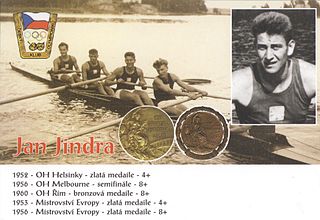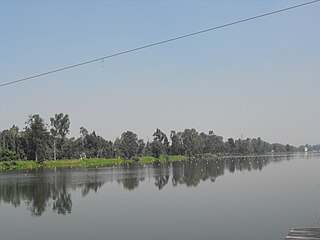Leslie James O'Connell is a New Zealand former representative rower. He was a two-time world champion and an Olympic champion who won his Olympic gold medal at the 1984 Summer Olympics in Los Angeles in the men's coxless four.
Lynley Coventry, much better known under her maiden name Lynley Hannen, is a former New Zealand rower.
Nicola "Nikki" Payne, also known as Nicola Mills and Nicola Payne-Mills, is a former New Zealand rower.
Ole Sverre Nafstad is a Norwegian competition rower and Olympic medalist.

Rodica Arba is a retired Romanian rower. She competed at the 1980, 1984 and 1988 Olympics and won two gold, one silver, and one bronze medal. At the world championships she won four gold, one silver and two bronze medals between 1981 and 1987, mostly in coxless pairs.
Allan Douglas "Jack" Horan is an Olympian oarsman who competed at the 1984 Summer Olympics as a representative of New Zealand.

The men's coxed four event was part of the rowing programme at the 1924 Summer Olympics. The competition, the fourth appearance of the event, was held from 13 to 17 July 1924 on the river Seine. There were 10 boats from 10 nations, with each nation limited to a single boat in the event. The event was won by Switzerland, the nation's second consecutive victory in the event; the two Swiss victories matched Germany for most among nations to that point. France earned its first medal in the event since 1900 with silver. The United States reached the podium for the second straight Games with a bronze medal. Hans Walter, a member of the Swiss crew in 1920 as well as this year, was the first man to win two medals in the event, and the only one to win two golds.
Edward Ashley Ives is a former American competitive rower and Olympic silver medalist. He represented the United States at the 1984 Summer Olympics in Los Angeles, where he received a silver medal in the men's coxed fours competition with Thomas Kiefer, Michael Bach, Gregory Springer, and John Stillings. Four years later, at the 1988 Summer Olympics, he finished in 9th place in the men's coxless pairs.
Jacob Jepsen Barsøe is a Danish rower who won a silver medal at the 2016 Summer Olympics and bronze medal at the 2012 Summer Olympics, both in the men's lightweight sculls.

The men's coxed four competition at the 1956 Summer Olympics took place at Lake Wendouree, Ballarat, Australia. It was held from 23 to 27 November and was won by the team from Italy. There were 10 boats from 10 nations, with each nation limited to a single boat in the event. Italy had previously won this event in 1928, tying Switzerland for second-most wins among nations. Sweden (silver) and Finland (bronze) each won their first medal in the men's coxed four. Switzerland had its three-Games silver-medal streak broken, without a Swiss crew competing.
The men's coxless four (M4-) competition at the 1984 Summer Olympics took place at Lake Casitas in Ventura County, California, United States. It was held from 31 July to 5 August and the outcome was wide open due to the Eastern Bloc boycott and thus the absence of the dominating team from the Soviet Union, and previously East Germany. The event was won by the team from New Zealand.

The men's coxed four (M4+) competition at the 1984 Summer Olympics took place at Lake Casitas in Ventura County, California, United States. There were 8 boats from 8 nations, with each nation limited to a single boat in the event. It was held from 30 July to 5 August and the dominant nations were missing from the event due to the Eastern Bloc boycott. Great Britain dominated the regatta, winning the nation's first rowing gold since the 1948 Summer Olympics, back then in front of their home crowd at the Henley Royal Regatta course. The 1984 event started Steve Redgrave's Olympic rowing success that would eventually see him win five Olympic gold medals. It was Great Britain's first victory in the men's coxed four and first medal of any colour in the event since 1912. The other medaling nations had also not been to the podium in the coxed four recently; the United States took silver, that nation's first medal in the event since 1952, while New Zealand's bronze was its first medal since 1968.

The men's coxed four competition at the 1952 Summer Olympics took place at Mei Bay, Helsinki, Finland. It was held from 20 to 23 August and was won by the team from Czechoslovakia. There were 17 boats from 17 nations, with each nation limited to a single boat in the event. The gold medal was Czechoslovakia's first medal in the men's coxed four. Switzerland earned its third consecutive silver medal, and sixth medal in seven Games dating back to 1920. The reigning champion United States took bronze.

The men's coxed four competition at the 1968 Summer Olympics took place at Virgilio Uribe Rowing and Canoeing Course, Mexico City, Mexico. It was held from 13 to 19 October and was unexpectedly won by the team from New Zealand, which secured the country its first Olympic rowing gold medal. Thirteen teams from 13 nations attended the competition. East Germany earned its first medal in its debut in the event, taking silver. Switzerland took bronze, its first medal in the men's coxed four since 1952.

The men's coxed four (M4+) competition at the 1976 Summer Olympics took place at the rowing basin on Notre Dame Island in Montreal, Quebec, Canada. It was held from 18 to 25 July and was won by the team from Soviet Union. There were 14 boats from 14 nations, with each nation limited to a single boat in the event. The victory was the Soviet Union's first medal in the men's coxed four. East Germany took its third consecutive silver medal, with entirely different crews each time. The defending champion West Germany received bronze this time. Hans-Johann Färber, the only rower from the 1972 gold medal team to return, became the fifth man to earn multiple medals in the event.
The women's coxless pairs rowing competition at the 1988 Summer Olympics took place at the Han River Regatta Course in Seoul, Korea. The event was held from 19 to 24 September.
The women's single sculls (W1x) rowing competition at the 1984 Summer Olympics took place at Lake Casitas in Ventura County, California, United States. It was held from 30 July to 4 August.

The men's eight (M8+) competition at the 1984 Summer Olympics took place at Lake Casitas in Ventura County, California, United States. It was held from 31 July to 5 August. There were 7 boats from 7 nations, with each nation limited to a single boat in the event. New Zealand had won the last two world championships, and the other strong team, East Germany, was absent from the event due to the Eastern Bloc boycott. This made New Zealand the strong favourite. But the final was won by Canada, with the United States and Australia the other medallists, and New Zealand coming a disappointing fourth.
Jim Stride is an Australian former representative rower. He was a six-time Australian national champion, raced in the Australia men's eight at the 1978 World Rowing Championships and competed in the men's coxless pair event at the 1984 Summer Olympics.








